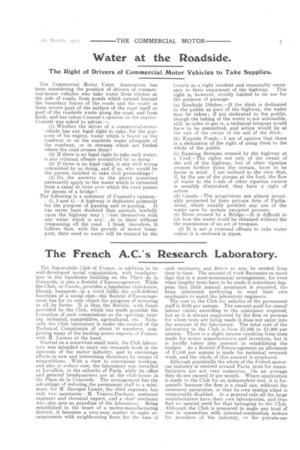Water at the Roadside.
Page 7

If you've noticed an error in this article please click here to report it so we can fix it.
The Right of Drivers of Commercial Motor Vehicles to Take Supplies.
The Commercial Motor Users Association has been considering the position of drivers of commercial-motor vehicles who take water from ditches at the side of roads, from ponds which extend beyond the boundary fences of the roads and the water in theni covers part of the surface of the road itself or part of the roadside waste along the road, and from fords, and has taken Counsel's opinion on the matter. Counsel was asked to advise :—
(1) Whether the driver of a commercial-motor vehicle has any legal right to take, for the purpose of his engine, water which is found on the roadway or on the roadside waste alongside of the roadway, or in streams which are forded where the road crosses them?
(2) If there is no legal right to take such water, is any criminal offence committed by so doing (3) If there is no legal right, is any civil wrong committed by so doing, and if so, who would be the person entitled to take civil proceedings ? (4) Do the answers to the above questions necessarily apply to the water which is extracted from a canal or river over which the road passes by means of a bridge ?
The following is a summary of Counsel's opinion : (1, 3 and 4).—A highway is dedicated primarily for the purpose of passing and re passing. It has never been doubted that animals lawfully upon the highway may r F'resh themselves with any water which is ava:_ file to them without trespassing off the road. I think, therefore, it follows that, with the growth of motor transport, their need to water will be treated by the
Courts as a right incident and reasonably necessary to their enjoyment of the highway. This right is, however, strictly limited to its use for the purpose of passage.
(a) Roadside Ditches.—If the ditch is dedicated to the public as part of the highway, the water may be taken ; if not dedicated to the public, though the taking of the water is not actionable, still, in order to get it, a technical trespass would have to be committed, and action would he at the suit of the owner of the soil of the ditch.
(b) Wayside Ponds.—I am of opinion that there is a dedication of the right of using them to the whole of the public.
(c) Running Streams crossed by the highway at
Ford.—The rights not only of the owner of the soil of the highway, but of other riparian owners further down the stream, have to be borne in mind. I am inclined to the view that, if, by the use of the stream at the ford, the flow of water to the lends of other riparian owners is sensibly diminished, they have a right of action.
(d) Canals.—The proprietors are almost invariably protected by their private Acts of Parliament, which usually prohibit any use of the water save by certain excepted persons. (e) River crossed by a Bridge.—It is difficult to see how the water could be obtained without the the commission of an act of trespass.
(2) It is not a criminal offence to take water unless it is enclosed in pipes.


























